|
|
|
Sort Order |
|
|
|
Items / Page
|
|
|
|
|
|
|
| Srl | Item |
| 1 |
ID:
192184
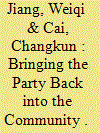

|
|
|
|
|
| Summary/Abstract |
While burgeoning research on China's state–society relations has paid attention to the Party, little is known about how the Party interacts with diverse actors and involves itself at the grassroots level in a specific region. This article delineates Party-advancement strategies at the community level in Shenzhen since 2013. To reclaim its leading role at the grassroots level, the Party opted for “Party–government disaggregation” by framing community governance as a Party-building affair, separating the government's affairs from those of the Party and “kicking” the government out of the community. Under the rubric of “reshaping Party–mass relations,” the Party penetrated deep into the community by innovating a “centre-periphery” organizational system, absorbing community elites in a top-down way and using a “service delivery taking the lead” method in a reciprocal exchange. In the end, the Party-governance structure, in which Party–mass relations are at the core, was reframed in the communities.
|
|
|
|
|
|
|
|
|
|
|
|
|
|
|
|
| 2 |
ID:
153635
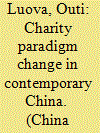

|
|
|
|
|
| Summary/Abstract |
This article addresses a remarkable conceptual change in China: the replacement of the perception of charities as organizations associated with anti-governmental activity by one that views charities as organized expressions of civic duty. This shift occurred within a period of just 20 years. Following theories of public policy paradigm change, this study analyses the specific societal, institutional and rhetorical changes that were required for the rehabilitation of charity in China; the articulation of a blueprint for the new paradigm; and the implementation of the model in practice, focusing on attempts to foster a charitable spirit and culture. This study is based on official documents and articles in the People’s Daily (人民日报). Furthermore, the analysis is complemented by interviews with staff members of charity associations carried out in Tianjin in 2007 and 2008. The findings contribute to the broader discussion of the features of China’s civil society by elaborating on the boundaries of acceptable civic action. The study shows how the party-state has permitted the emergence of a space for the expression of a voluntary charitable spirit while still expecting that charitable spirit to be expressed within the confines of state-defined morally correct acts.
|
|
|
|
|
|
|
|
|
|
|
|
|
|
|
|
| 3 |
ID:
193188
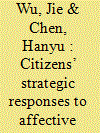

|
|
|
|
|
| Summary/Abstract |
Previous studies on affective governance (情感治理) emphasize how the state has regulated and manipulated citizens’ emotions and psychology. This article, however, shows a different political landscape in which citizens employ emotional strategies to persuade and bargain with the government. Drawing on intensive fieldwork conducted in China from 2019 to 2020, we find that citizens deploy targeted emotional strategies to advance specific interests such as building reciprocal relations with the government, arousing political elites’ empathy, or addressing their most urgent needs. We argue that the government’s deliberate use of affective governance has, on the one hand, unexpectedly revealed and reinforced the conflict between the positive emotions that the state has attempted to exhibit and citizens’ daily experiences and, on the other hand, increased positive feelings towards the government’s efficacy in addressing citizens’ grievances. Taking rare disease patient groups as an example, this article maps and compares three main emotional strategies adopted by civil society in China, namely gratefulness, sadfishing, and dissent. By deciphering these emotional strategies, this article helps us understand the emotional synergy between state and society and sheds new light on the governance of China.
|
|
|
|
|
|
|
|
|
|
|
|
|
|
|
|
| 4 |
ID:
165081
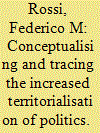

|
|
|
|
|
| Summary/Abstract |
The territorialisation of politics is a crucial transformation in state–society relations that has implications on how contemporary politics works. Defined here as the dispute for the physical control of space, be it a municipality, province or portion of land, within one or more politically constituted entities. It does not mean the emergence of a new regime type, but the process through which the territory re-emerges as a new cleavage after neoliberal reforms and authoritarian regimes have weakened/dissolved neo-corporatist arrangements for the resolution of socio-political conflicts in society. It is a cleavage because central political divisions are produced as a result of the physical encounter of or distance between political actors and of the dispute for the control of a territory for sociopolitical goals and causes that are not always territorially defined. Departing from this definition, I also raise potential explanatory hypotheses for the transformations that favoured this transformation in Argentina.
|
|
|
|
|
|
|
|
|
|
|
|
|
|
|
|
| 5 |
ID:
156520
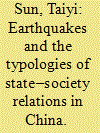

|
|
|
|
|
| Summary/Abstract |
The proliferation of civil society organizations after the 2008 Wenchuan earthquake and the 2013 Lushan earthquake in China has caught the attention of scholars in Chinese politics and disaster politics. Immediately after the earthquakes and during the recovery period, civil society organizations were given a rare opportunity to work closely and intensely with the state. As a result, these organizations adjusted their behaviour – sometimes compromising with the state on many fronts – in exchange for better relations with the state and in order to achieve their goals, but they had to work in new and creative ways. Drawing on evidence from a dozen case studies and 61 in-depth interviews with government officials and leaders of civil society organizations in Sichuan Province, this article argues that we can map the state’s preferences and policy distinctions through its varied responses to these organizations during an earthquake recovery period. Specifically, whether the state is more effective in delivering public goods and services in a given area and whether the goals of civil society organizations align with those of state are two key determinants of relations between the state and civil society organizations. This article proposes a comprehensive typology of such relations in China: complementary, cooperative, competitive and confrontational. These categories are not static, because the government and civil society organizations adjust their policies and behaviour as they interact. These learning experiences, triggered by the earthquakes, create a dynamic process of evolving state–society relations in China today.
|
|
|
|
|
|
|
|
|
|
|
|
|
|
|
|
| 6 |
ID:
141103
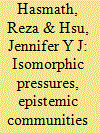

|
|
|
|
|
| Summary/Abstract |
This article suggests that the lack of meaningful collaboration between the state and NGOs in China is not solely a result of the state seeking to restrict the development of the sector, or the fear of a potential opposing actor to the state; instead, interviews with NGOs in Beijing and Shanghai suggest that a lack of meaningful engagement between the state and NGOs can be partially attributed to isomorphic pressures within state–NGO relations, and insufficient epistemic awareness of NGO activities on the part of the state. In fact, the evidence suggests that once epistemic awareness is achieved by the state, it will have a stronger desire to interact with NGOs – with the caveat that the state will seek to utilize the material power of NGOs, rather than their symbolic, interpretive or geographical capital.
|
|
|
|
|
|
|
|
|
|
|
|
|
|
|
|
| 7 |
ID:
141104
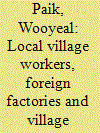

|
|
|
|
|
| Summary/Abstract |
In market reform China, contentious and unfair labour relations between vulnerable migrant workers and exploitative foreign factory owners are one of the most critical issues of the political economy. This article analyses another group of workers – non-migrant local village workers – who protect themselves from foreign employers using two political resources: collective land-use rights and local political organizations, such as village governments, affective networks and physical forces, during their suburban village's industrialization. Based on intensive ethnographic fieldwork in Shandong (Qingdao) and other coastal regions in 2007, 2008 and 2011–2013, this article attempts to answer the questions of how local village workers protect their labour rights without reliable trade unions or rigorous governmental protection. How can villagers protect, if not maximize, their interests in their relations with the foreign factories in their villages? It also contrasts local labour relations in Qingdao with migrant labour relations in other coastal regions.
|
|
|
|
|
|
|
|
|
|
|
|
|
|
|
|
| 8 |
ID:
162617
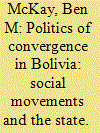

|
|
|
|
|
| Summary/Abstract |
The convergence of social movements in Bolivia was a decisive factor in bringing President Evo Morales and the Movement Towards Socialism (Movimiento al Socialismo, hereafter MAS) to power in 2006. Yet in recent years, this convergence has become fraught with internal tensions as the state’s extractivist development model and promises for plurinationalism and alternative forms of development reveal fundamental contradictions. This paper traces the formation of social movement alliances over time, revealing their power to effect change and their strength when there is unity in diversity. Rather than ‘neoliberalism’ which represented the injustice frame and united identity- and class-based politics during the rise of the MAS, the single greatest threat to the indigenous, peasants, originarios, women and the youth in the current context is extractivism.
|
|
|
|
|
|
|
|
|
|
|
|
|
|
|
|
| 9 |
ID:
148520
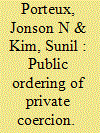

|
|
|
|
|
| Summary/Abstract |
This study explores collaboration between state actors and non-state specialists in the market for coercion. We focus on the case of forced evictions in South Korea, where violence carried out by private companies has occurred with the implicit, and at times explicit, sanctioning of the state. This level of government–private security cooperation has traditionally been explained by various hypotheses, including arguments about the weak capacity of a state to enforce compliance, trends in the neo-liberal marketization of state power, or as the outcome of a state being captured by the capitalist classes. Documenting the history of urban redevelopment projects and changes in government responses to major protest incidents in Korea, we instead argue that this niche market for private force is an observable implication of a shift in state–society relations in the wake of democratization. This phenomenon is, in effect, a very undemocratic response to democratization, by state elites.
|
|
|
|
|
|
|
|
|
|
|
|
|
|
|
|
| 10 |
ID:
163233
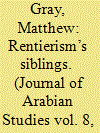

|
|
|
|
|
| Summary/Abstract |
his paper examines rentier state theory (RST), and specifically “rentierism” as a more refined and nuanced variant of RST, arguing that while rentierism provides considerable utility in explaining the state-society relationships of the contemporary Arab states of the Persian Gulf, it is insufficient as a stand-alone explanation, and needs to be considered as a political dynamic of the state-society relationship, rather than as a structural explanation for the state itself, as early RST more ambitiously sought to do. Rentierism therefore needs to be utilized in combination with two other explanatory frameworks, neopatrimonialism and state capitalism. In effect, these are rentierism’s theoretical “siblings”: they sharpen a rentier analysis by providing greater nuance about how elite networks, business-government relations, and personalized politics operate and interact in the allocative settings of the Gulf, as well as illustrating both the scope and the limits of rentierism as an explanatory framework.
|
|
|
|
|
|
|
|
|
|
|
|
|
|
|
|
| 11 |
ID:
156518
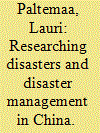

|
|
|
|
|
| Summary/Abstract |
This article offers an introduction to China Information’s special issue on disasters and disaster management. It is argued here that studying disasters and disaster management should not only improve our understanding of them as social phenomena and thereby increase our ability to manage disasters better, but also that disasters offer unique windows for researchers to study Chinese society and explain social and political changes therein. The article further argues that although research in natural disasters in China has developed rapidly both in terms of disciplinary approaches and topics, such research has still to overcome its narrow event-based nature and embrace more cross-disciplinary and comparative approaches geographically and historically, and disaster studies should investigate different types of disasters.
|
|
|
|
|
|
|
|
|
|
|
|
|
|
|
|
| 12 |
ID:
181141
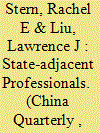

|
|
|
|
|
| Summary/Abstract |
This article complicates the conventional wisdom that Chinese lawyers are either politically liberal activists or apolitical hired guns by training our attention on the group of lawyers who choose to stand adjacent to the state and participate in governance. Through an examination of how and why winners of the state-sanctioned Outstanding Lawyer Award participate in politics, we illustrate how state-adjacent lawyers provide the state with information and persuade others to behave in ways the state considers appropriate. Although proximity to power affords some social and professional benefits, award winners are also motivated by a commitment to improving Chinese society. By highlighting the political role played by lawyers who serve as a bridge between state and society, we open the door to future research on the relationship between the state and professionals in other industries and countries, and call for continued attention to how inequality shapes opportunities for political participation in China.
|
|
|
|
|
|
|
|
|
|
|
|
|
|
|
|
| 13 |
ID:
160037
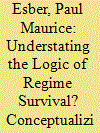

|
|
|
|
|
| Summary/Abstract |
Both reform and revolutionary movements in the Arab world have called on institutions of state to follow through on the cries for dignity, bread and social justice emanating from the street. These movements are not necessarily mutually exclusive, and may demonstrate overlapping commonalities of practice. Asef Bayat has designated this phenomenon an example of ‘refo-lution’, the amalgamation of a revolutionary agenda with a reform process. This paper will argue that 2011/2012 demonstrations in Jordan fall into this category, and that they elucidate that the relationship between the Hashemite monarchy and Jordanian society needs to be reframed for political stability. The theoretical frame of this article, grounded in the selectorate theory of Bruce Bueno de Mesquita in conjunction with insights from Nazih Ayubi, suggests that this stability requires a more defined separation of powers and functions of the monarchy and the parliament, making the latter an autonomous legislative body.
|
|
|
|
|
|
|
|
|
|
|
|
|
|
|
|
|
|
|
|
|